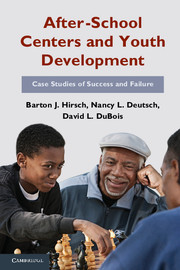Book contents
- Frontmatter
- Contents
- Figure and Tables
- Preface
- Introduction
- Midwest Center
- North River Center
- West River Center
- 10 The Jewel in the Crown
- 11 Midnight: A Teen Father Stays the Course
- 12 Tommiana: A Contest between Closeness and Competition
- 13 Putting It All Together: What Have We Learned?
- Conclusion
- Appendix Data Sources
- References
- Index
12 - Tommiana: A Contest between Closeness and Competition
Published online by Cambridge University Press: 05 June 2012
- Frontmatter
- Contents
- Figure and Tables
- Preface
- Introduction
- Midwest Center
- North River Center
- West River Center
- 10 The Jewel in the Crown
- 11 Midnight: A Teen Father Stays the Course
- 12 Tommiana: A Contest between Closeness and Competition
- 13 Putting It All Together: What Have We Learned?
- Conclusion
- Appendix Data Sources
- References
- Index
Summary
Tommiana is a somewhat typical twelve-year-old girl. With a number of friends and some close adult relationships, including with West River staff, she is active and involved in multiple activities at the center. Dance is Tommiana’s favorite activity and is led by the staff person with whom she has the closest relationship. At the same time, Tommiana is moody, and in the middle of the year begins to withdraw from the dance program. Furthermore, Tommiana stops coming to the center for a few weeks in March, after losing to a peer in a center-wide competition. No one appears to follow-up on her absence, suggesting that she may have been somewhat lost in the shuffle. In this chapter, we will see how West River provided important support for Tommiana, but also had some costs. Her case illustrates one of the strengths of a comprehensive youth center, wherein relationships with staff can spread across activities and different PARCs can complement each other. Yet it also reminds us of the importance of the fit between individual youth and a program’s culture, particularly around issues of competition. Finally, Tommiana’s story provides a look at the missed opportunities for support when staff fail to capitalize on potential linkages beyond the walls of the center.
in the beginning
Tommiana is a petite girl who prides herself on being well dressed. She has been coming to West River since she was in the first grade and most of her friends also attend the center. Tommiana tells us that she used to attend the club every day. In third grade, she stopped coming as regularly because she lived further away from West River. She reports this period of lesser attendance as a “bad” event in her history at the center. At the time of our study, she reported coming almost every day but was observed at the center less frequently as the year progressed – something we discuss further throughout the chapter.
- Type
- Chapter
- Information
- After-School Centers and Youth DevelopmentCase Studies of Success and Failure, pp. 259 - 281Publisher: Cambridge University PressPrint publication year: 2011



